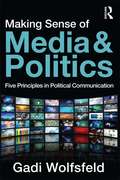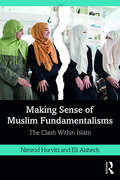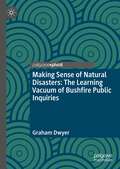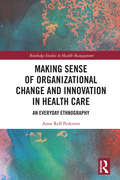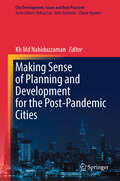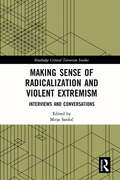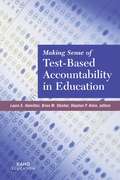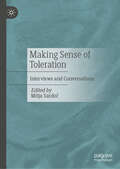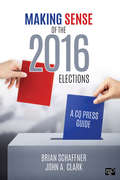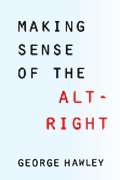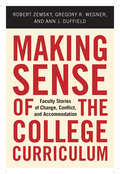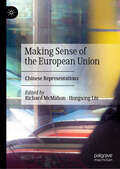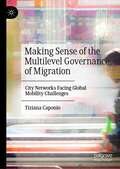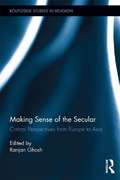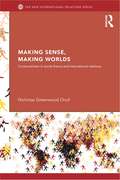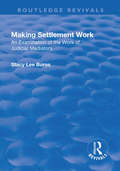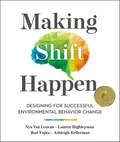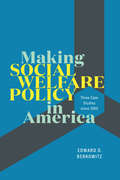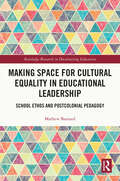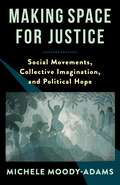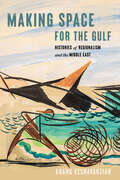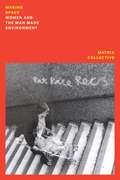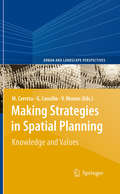- Table View
- List View
Making Sense of Media and Politics: Five Principles in Political Communication
by Gadi WolfsfeldPolitics is above all a contest, and the news media are the central arena for viewing that competition. One of the central concerns of political communication has to do with the myriad ways in which politics has an impact on the news media and the equally diverse ways in which the media influences politics. Both of these aspects in turn weigh heavily on the effects such political communication has on mass citizens. In Making Sense of Media and Politics, Gadi Wolfsfeld introduces readers to the most important concepts that serve as a framework for examining the interrelationship of media and politics: political power can usually be translated into power over the news media when authorities lose control over the political environment they also lose control over the news there is no such thing as objective journalism (nor can there be) the media are dedicated more than anything else to telling a good story the most important effects of the news media on citizens tend to be unintentional and unnoticed. By identifying these five key principles of political communication, the author examines those who package and send political messages, those who transform political messages into news, and the effect all this has on citizens. The result is a brief, engaging guide to help make sense of the wider world of media and politics and an essential companion to more in-depths studies of the field.
Making Sense of Muslim Fundamentalisms: The Clash Within Islam
by Nimrod Hurvitz Eli AlshechStudying Muslim fundamentalisms, this book compares key movements, examining their commonalities, differences, and intricate relations, as well as their achievements and failures. Muslim fundamentalisms have the sympathy of approximately half of the Muslim population in the world. Yet, they are divided among themselves and are in a constant state of controversy. The research dwells on the leading fundamentalist movements, such as the Muslim Brothers, Tablighi-Jamaʻat, al-Qaeda, and ISIS, and illustrates how differently they think about the West and its culture, democracy, and women’s presence in the public sphere. By identifying these trends, and studying them comparatively, the book enables the interested reader to make sense of the plethora of fundamentalist movements, which are otherwise lumped together by the media and are barely discernible for the reader. Whereas most studies of Muslim fundamentalism focus on organizational or militant actions that the movements perform, this study concentrates on their efforts to Islamize society through everyday life in a peaceful manner. Identifying the different strands of Muslim fundamentalisms, the book will be a key resource to a wide range of readers including researchers and students interested in politics, religious, Islamic and Middle Eastern Studies.
Making Sense of Natural Disasters: The Learning Vacuum of Bushfire Public Inquiries
by Graham DwyerThis book examines the ways in which emergency management organizations make sense and learn from natural disasters. Examining recent bushfires in Australia, it demonstrates that whilst public inquiries that follow such disasters can be important for learning and change, they have ultimately created a learning vacuum insofar as their recommendations repeat themselves. This has kept governments and society focused on learning lessons about the past, rather than for the future. Accordingly, this book recommends a new approach to sensemaking and learning focused on prospective planning rather than retrospective recommendations, and where planning for the future is seen as the shared responsibility of the government, society, and the emergency management community in Australia and beyond.
Making Sense of Organizational Change and Innovation in Health Care: An Everyday Ethnography (Routledge Studies in Health Management)
by Anne Reff PedersenThis book explores the hospital via organisational ethnography (OE), an approach that involves a mix of fieldwork methods designed to analyse the hospital which also includes participatory observation, qualitative interviews and shadowing. One way to define a hospital is by its high level of formal organisation, resulting in written or digital communication as the main source of communication in patient journals, minutes and medical and quality guidelines. In contrast, in this book, the aspects of the informal organisation will be the focus. In spite of the many formal regulations of healthcare, hospitals are also chaotic organising places where many different groups of people interact in order to negotiate, to practice and to make sense of daily work tasks. The underlying argument is that, in the mundane everyday life of hospitals, frontline workers and their interactions with patients and local managers remain at the core of organising hospitals. The overall purpose of this book is to report stories back from the field of healthcare, demonstrating how people, spaces and work (as examples of events) become important elements of organising hospitals. The book will be of interest to students and scholars in and across healthcare management, organisation studies, ethnography, sociology, qualitative methods, anthropology, service management and cultural studies.
Making Sense of Planning and Development for the Post-Pandemic Cities (City Development: Issues and Best Practices)
by Kh Md NahiduzzamanThis book holds a distinguished promise of an intellectual understanding and complete account of that shifts in laying out resilient planning, development, and policy landscapes for the cities to come. The approach offers a unique perspective on planning and development in the post-pandemic era, addressing the interconnectedness of diverse spatial, social, cultural, economic, demographic, and political aspects. It provides insights into the transformational behavior of cities and citizens, explores the influence of remote work on the real estate market, emphasizes the need for resilient infrastructure and adaptive planning, and reinforces the association between health infrastructure and planning for resilient cities. The book provides a comprehensive account of the shifts and challenges faced in planning and development due to climate change and the COVID-19 pandemic. It explores transformational urban planning, sociocultural, and economic landscapes and addresses topics, including land use changes, transformational real estate market, urban recreational space, adaptive infrastructure, and the need for resilient planning. It offers valuable insights for urban designers, architects, geographers, city planners, policymakers, and pubic officials seeking to enhance city resilience in the post-pandemic era. The intended readership of the book includes urban designers, architects, city planners, geographers, policy makers, and public officials. It caters to individuals interested in gaining a critical understanding of the interconnectedness between various spatial, social, cultural, economic, demographic, and political aspects. The content level is academic, offering scholarly insights and a unique post-pandemic perspective on enhancing city resilience.
Making Sense of Radicalization and Violent Extremism: Interviews and Conversations (Routledge Critical Terrorism Studies)
by Mitja SardočThis volume brings together interviews with leading scholars to discuss some of the most important issues associated with radicalization, violent extremism and terrorism. The overall aim of these interviews is to move beyond the ‘conventional wisdom’ over radicalization and violent extremism best represented by many of its well-known slogans, metaphors, aphorisms alongside various other thought-terminating clichés. A vast range of topics are tackled in these conversations, including issues as diverse as the genealogy of radicalization and violent extremism, the rhetoric of emergency politics (’the language of fear’), the ethics of securitization, mutual radicalization, the challenges arising out of the relationship between cognitive and behavioural radicalization, Islamism bias in research on radicalization, the ethics of espionage (as an integral element of the ‘war on terror’), the epistemic dimension of radicalization, the application of the just war conceptual framework to terrorism, and the ethics of exceptional means when addressing security-related issues, to name a few. The unifying assumption of the interviews in the volume is the complex nature of radicalization, violent extremism and conflicting diversity, as well as their interwoven relationship. While radicalization has become one of the ‘great buzzwords’ of the intelligence and security ‘industry’, pleas for its very abandonment as a useful analytical category have also started to emerge. This book will be of much interest to students of terrorism studies, radicalisation, violent extremism, security studies and International Relations, in general.
Making Sense of Science: Separating Substance from Spain
by Cornelia DeanCornelia Dean draws on her 30 years as a science journalist with the New York Times to expose the flawed reasoning and knowledge gaps that handicap readers when they try to make sense of science. She calls attention to conflicts of interest in research and the price society pays when science journalism declines and funding dries up.
Making Sense of Test-Based Accountability in Education
by Brian M. Stecher Laura S. Hamilton Stephen P. KleinTest-based accountability systems that attach high stakes to standardized test results have raised a number of issues on educational assessment and accountability. Do these high-stakes tests measure student achievement accurately? How can policymakers and educators attach the right consequences to the results of these tests? And what kinds of tradeoffs do these testing policies introduce? This book responds to the growing emphasis on high-stakes testing and offers recommendations for more-effective test-based accountability systems.
Making Sense of Toleration: Interviews and Conversations
by Mitja SardočThis book brings together a collection of interviews and conversations with leading scholars across different disciplines and areas of research including moral and political philosophy, history, sociology, political theory, psychology, and jurisprudence, among others. It provides an authoritative presentation of contemporary accounts of toleration, their conceptual foundations, and a comprehensive presentation of the different concepts most commonly associated with it (e.g. civility, dignity, coercion, harm, conflict, disagreement, secularism, power, domination, trust, non-interference, neutrality, fairness, pluralism, respect, recognition and ultimately diversity itself). The interviews and conversations published in this volume address some of the most pressing controversies on toleration (and related issues) at both the theoretical and practical levels. Alongside customary refinements of arguments and positions usually embedded in academic conversations, these interviews provide unique insights into the ‘behind the scenes’ on one of the central topics in contemporary scholarly research.
Making Sense of the 2016 Elections: A CQ Press Guide
by Brian Schaffner John A. ClarkGet a big picture understanding of what happened in the 2016 elections and why. Designed to be used as a supplement to American politics texts, this brief overview from Brian Schaffner and John Clark provides a concise analysis, going beyond horserace journalism, and gives students an accessible insight into political scientists' view of this ground breaking election. Students will benefit from seeing how broader political science concepts apply to a campaign and election that is fresh in their minds. Whether packaged with another SAGE | CQ Press title or used on its own, Schaffner and Clark’s Making Sense of the 2016 Elections will give your students the key insight they need.
Making Sense of the 2016 Elections: A CQ Press Guide
by Brian Schaffner John A. ClarkGet a big picture understanding of what happened in the 2016 elections and why. Designed to be used as a supplement to American politics texts, this brief overview from Brian Schaffner and John Clark provides a concise analysis, going beyond horserace journalism, and gives students an accessible insight into political scientists' view of this ground breaking election. Students will benefit from seeing how broader political science concepts apply to a campaign and election that is fresh in their minds. Whether packaged with another SAGE | CQ Press title or used on its own, Schaffner and Clark’s Making Sense of the 2016 Elections will give your students the key insight they need.
Making Sense of the Alt-Right
by George HawleyDuring the 2016 election, a new term entered the mainstream American political lexicon: “alt-right,” short for “alternative right.” Despite the innocuous name, the alt-right is a white-nationalist movement. Yet it differs from earlier racist groups: it is youthful and tech savvy, obsessed with provocation and trolling, amorphous, predominantly online, and mostly anonymous. And it was energized by Donald Trump’s presidential campaign. In Making Sense of the Alt-Right, George Hawley provides an accessible introduction and gives vital perspective on the emergence of a group whose overt racism has confounded expectations for a more tolerant America.Hawley explains the movement’s origins, evolution, methods, and core belief in white-identity politics. The book explores how the alt-right differs from traditional white nationalism, libertarianism, and other online illiberal ideologies such as neoreaction, as well as from mainstream Republicans and even Donald Trump and Steve Bannon. The alt-right’s use of offensive humor and its trolling-driven approach, based in animosity to so-called political correctness, can make it difficult to determine true motivations. Yet through exclusive interviews and a careful study of the alt-right’s influential texts, Hawley is able to paint a full picture of a movement that not only disagrees with liberalism but also fundamentally rejects most of the tenets of American conservatism. Hawley points to the alt-right’s growing influence and makes a case for coming to a precise understanding of its beliefs without sensationalism or downplaying the movement’s radicalism.
Making Sense of the College Curriculum: Faculty Stories of Change, Conflict, and Accommodation
by Robert Zemsky Gregory R Wegner Ann J. DuffieldReaders of Making Sense of the College Curriculum expecting a traditional academic publication full of numeric and related data will likely be disappointed with this volume, which is based on stories rather than numbers. The contributors include over 185 faculty members from eleven colleges and universities, representing all sectors of higher education, who share personal, humorous, powerful, and poignant stories about their experiences in a life that is more a calling than a profession. Collectively, these accounts help to answer the question of why developing a coherent undergraduate curriculum is so vexing to colleges and universities. Their stories also belie the public’s and policymakers’ belief that faculty members care more about their scholarship and research than their students and work far less than most people.
Making Sense of the European Union: Chinese Representations
by Richard McMahon Hongsong LiuThis book explores how different Chinese social groups portray or discuss the European Union. The authors engage with issues such as trade, populism, EU crises, systemic rivalry and the Chinese media’s representation of European integration and Brexit. They use qualitative, quantitative and mixed-methods empirical research to show that, despite China’s authoritarian political system, social actors construct complex representations of the EU that may influence government policy. Rather than dismissing Chinese scholars as little more than state agents, one can benefit from their unique insights by analysing the prisms through which they view the world. In doing so, Western scholars can better understand the distinct institutional and cultural traditions that filter their own views of China.
Making Sense of the Multilevel Governance of Migration: City Networks Facing Global Mobility Challenges
by Tiziana CaponioThis book examines the nexus between City Networks, multilevel governance and migration policy. Examining several City Networks operating in the European Union and the United States of America’s multilevel political settings, it brings migration research into conversation with both policy studies and political science. One of the first comparative studies of City Networks and migration, the book argues that multilevel governance is the result of a contingent process of converging interests and views between leaders in network organisations and national governments, the latter continuing to play a key gatekeeping role on this topical issue even in the supranational EU system.
Making Sense of the Secular: Critical Perspectives from Europe to Asia (Routledge Studies in Religion #24)
by Ranjan GhoshThis book offers a wide range of critical perspectives on how secularism unfolds and has been made sense of across Europe and Asia. The book evaluates secularism as it exists today – its formations and discontents within contemporary discourses of power, terror, religion and cosmopolitanism – and the focus on these two continents gives critical attention to recent political and cultural developments where secularism and multiculturalism have impinged in deeply problematical ways, raising bristling ideological debates within the functioning of modern state bureaucracies. Examining issues as controversial as the state of Islam in Europe and China’s encounters with religion, secularism, and modernization provides incisive and broader perspectives on how we negotiate secularism within the contemporary threats of terrorism and other forms of fundamentalism and state-politics. However, amidst the discussions of various versions of secularism in different countries and cultural contexts, this book also raises several other issues relevant to the antitheocratic and theocratic alike, such as: Is secularism is merely a nonreligious establishment? Is secularism a kind of cultural war? How is it related to "terror"? The book at once makes sense of secularism across cultural, religious, and national borders and puts several relevant issues on the anvil for further investigations and understanding.
Making Sense, Making Worlds: Constructivism in Social Theory and International Relations (New International Relations)
by Nicholas OnufNicholas Onuf is a leading scholar in international relations and introduced constructivism to international relations, coining the term constructivism in his book World of Our Making (1989). He was featured as one of twelve scholars featured in Iver B. Neumann and Ole Wæver, eds., The Future of International Relations: Masters in the Making? (1996); and featured in Martin Griffiths, Steven C. Roach and M. Scott Solomon, Fifty Key Thinkers in International Relations, 2nd ed. (2009). This powerful collection of essays clarifies Onuf’s approach to international relations and makes a decisive contribution to the debates in IR concerning theory. It embeds the theoretical project in the wider horizon of how we understand ourselves and the world. Onuf updates earlier themes and his general constructivist approach, and develops some newer lines of research, such as the work on metaphors and the re-grounding in much more Aristotle than before. A complement to the author’s groundbreaking book of 1989, World of Our Making, this tightly argued book draws extensively from philosophy and social theory to advance constructivism in International Relations. Making Sense, Making Worlds will be vital reading for students and scholars of international relations, international relations theory, social theory and law.
Making Settlement Work: An Examination of the Work of Judicial Mediators (Routledge Revivals)
by Stacy Lee BurnsThis title was first published in 2000. The trend in the public courts and in the private sector toward resolving civil cases through mediation, as opposed to arbitration or trial, seems inescapable. This book documents the emergence of a burgeoning private dispute resolution industry utilizing the services of retired judges, many of whom left the bench early to work as professional mediators.
Making Shift Happen: Designing for Successful Environmental Behavior Change
by Nya Van Leuvan Lauren Highleyman Rod Fujita Ashleigh KellermanNautilus Book Award Winner: An “engagingly written” behavioral science-based guide to tackling our urgent environmental problems (Robert B. Cialdini, author of Influence: The Psychology of Persuasion).To create a sustainable future and achieve positive, durable change, we must design solutions based directly on how people think, make decisions, and act. From hotels that save water (and money) using simple signage to energy suppliers that boost participation in renewable energy programs through mere enrollment-form tweaks, it’s clear that shifting the behavior of millions for the better is possible.Based on decades of research into what drives behavior change, Making Shift Happen provides a suite of powerful tools to transform the world. It features A-to-Z guidance on how to design a behavior change initiative—from choosing the right audience and uncovering what drives their behavior to designing, prototyping, testing, and implementation. Clear instructions and real-world examples empower you to apply hundreds of behavioral science solutions including:Using social norms to spread positive environmental behaviorsSelecting and testing stories, metaphors, and values to frame information for each audienceCatalyzing action by aligning your initiative with your audience’s personal and social motivatorsBreaking bad habits and building positive onesCapturing your audience’s attention and reducing barriers to actionConnecting people with nature and building empathy for the environment and its inhabitantsMaking Shift Happen is a must-have guide for practitioners in non-profits, governments, and businesses looking to design successful campaigns and initiatives that shift behaviors and mindsets toward positive environmental outcomes and a better future for all.“Completely fascinating—we’ve learned a lot about the ways minds work in the last decades and that may help us figure out how to appeal to our better angels more effectively than in the past. Rest assured that people who want to sell us junk are paying attention to these insights—the rest of us better do so too!” —Bill McKibben, author of The End of Nature
Making Social Welfare Policy in America: Three Case Studies since 1950
by Edward D. BerkowitzAmerican social welfare policy has produced a health system with skyrocketing costs, a disability insurance program that consigns many otherwise productive people to lives of inactivity, and a welfare program that attracts wide criticism. Making Social Welfare Policy in America explains how this happened by examining the historical development of three key programs—Social Security Disability Insurance, Medicare, and Temporary Aid to Needy Families. Edward D. Berkowitz traces the developments that led to each program’s creation. Policy makers often find it difficult to dislodge a program’s administrative structure, even as political, economic, and cultural circumstances change. Faced with this situation, they therefore solve contemporary problems with outdated programs and must improvise politically acceptable solutions. The results vary according to the political popularity of the program and the changes in the conventional wisdom. Some programs, such as Social Security Disability Insurance, remain in place over time. Policy makers have added new parts to Medicare to reflect modern developments. Congress has abolished Aid to Families of Dependent Children and replaced with a new program intended to encourage work among adult welfare recipients raising young children. Written in an accessible style and using a minimum of academic jargon, this book illuminates how three of our most important social welfare programs have come into existence and how they have fared over time.
Making Space for Cultural Equality in Educational Leadership: School Ethos and Postcolonial Pedagogy (Routledge Research in Decolonizing Education)
by Mathew BarnardThis book foregrounds postcolonial theory as a lens through which to explore the concept of ‘global heritage’ and argues that the meso-level spaces of institutional ethos and cultural pedagogy must take an active role in the pursuit of cultural equality.Through interviews and accounts of observational, empirical data, chapters draw attention to how the cultural capital of Global Majority students is institutionally positioned as a racialised and inferior cultural capital that is constantly required to ‘prove itself’ in the Western school. Ultimately, the book contributes to international discussion on decolonising education and the spaces within in order to enact change, further the field, and more precisely to recognise the importance of global heritage as vital to a transformative understanding of the West’s cultural identity within a globalised world.This book will appeal to scholars, researchers and post-graduate researchers in the fields of multicultural education, school leadership, management and administration, and education policy and politics more broadly. Those interested in social justice, ideas of cultural and racial equality, and the sociology of education more broadly will also benefit from the volume.
Making Space for Justice: Social Movements, Collective Imagination, and Political Hope
by Michele Moody-AdamsFrom nineteenth-century abolitionism to Black Lives Matter today, progressive social movements have been at the forefront of social change. Yet it is seldom recognized that such movements have not only engaged in political action but also posed crucial philosophical questions about the meaning of justice and about how the demands of justice can be met.Michele Moody-Adams argues that anyone who is concerned with the theory or the practice of justice—or both—must ask what can be learned from social movements. Drawing on a range of compelling examples, she explores what they have shown about the nature of justice as well as what it takes to create space for justice in the world. Moody-Adams considers progressive social movements as wellsprings of moral inquiry and as agents of social change, drawing out key philosophical and practical principles. Social justice demands humane regard for others, combining compassionate concern and robust respect. Successful movements have drawn on the transformative power of imagination, strengthening the motivation to pursue justice and to create the political institutions and social policies that can sustain it by inspiring political hope.Making Space for Justice contends that the insights arising from social movements are critical to bridging the gap between discerning theory and effective practice—and should be transformative for political thought as well as for political activism.
Making Space for the Gulf: Histories of Regionalism and the Middle East (Worlding the Middle East)
by Arang KeshavarzianThe Persian Gulf has long been a contested space—an object of imperial ambitions, national antagonisms, and migratory dreams. The roots of these contestations lie in the different ways the Gulf has been defined as a region, both by those who live there and those beyond its shore. Making Space for the Gulf reveals how capitalism, empire-building, geopolitics, and urbanism have each shaped understandings of the region over the last two centuries. Here, the Gulf comes into view as a created space, encompassing dynamic social relations and competing interests. Arang Keshavarzian writes a new history of the region that places Iran, Iraq, and the Arabian Peninsula together within global processes. He connects moments more often treated as ruptures—the discovery of oil, the Iranian Revolution, the rise and decline of British empire, the emergence of American power—and crafts a narrative populated by a diverse range of people—migrants and ruling families, pearl-divers and star architects, striking taxi drivers and dethroned rulers, protectors of British India and stewards of globalized American universities. Tacking across geographic scales, Keshavarzian reveals how the Gulf has been globalized through transnational relations, regionalized as a geopolitical category, and cleaved along national divisions and social inequalities. When understood as a process, not an object, the Persian Gulf reveals much about how regions and the world have been made in modern times. Making Space for the Gulf offers a fresh understanding of this globally consequential place.
Making Space: Women and the Manmade Environment
by MatrixTimely re-issue of the groundbreaking manifesto for feminist architectureMaking Space is a pioneering work first published in 1984 which challenges us to look at how the built environment impacts on women&’s lives. It exposes the sexist assumptions on gender and sexuality that have a fundamental impact on the way buildings are designed and our cities are planned.Written collaboratively by the feminist collective Matrix, tthe book provide a full blown critique of the patriarchal built environment both in the home and in public space, and outline alternative forms of practice that are still relevant today. Making Space remains a path breaking book pointing to possibilities of a feminist future.Some authors worked for the London-based Matrix Feminist Architect&’s collective, an architectural practice set up in 1980 seeking to establish a feminist approach to design. They worked on design projects—such as community, children and women&’s centres. Others were engaged in building work, teaching and research.The new edition comes with a new introduction examining the context, process and legacy of Making Space written by leading feminists in architecture.
Making Strategies in Spatial Planning
by Grazia Concilio Valeria Monno Maria CerretaThis book discusses strategic spatial planning with emphasis on the role of values and cognitions dynamics within the planning-evaluation interplay. In the book, values and cognitions dynamics are investigated as crucial aspects of planning practices devoted to the development of strategic actions strictly linked to spatial contexts. Different methodologies and approaches are examined to support collaborative decision making and to manage comprehensive and participatory knowledge throughout strategic planning processes. The discussion is carried out from both theoretical and practical points of view. The book also dissects the multiple meanings of strategic planning and its implication in terms of mobilization and creation of values and knowledge. Critical issues are examined in relation to both the dynamics of negotiation and construction of diverse values and knowledge in planning processes, and in relation to some experiences carried out in different urban contexts.
